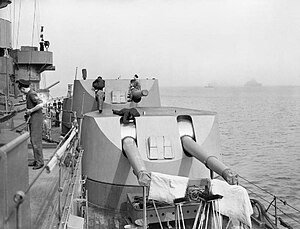| Ordnance BL 6-inch gun Mk XXII | |
|---|---|
 Gun turrets on HMS Rodney, 1940 Gun turrets on HMS Rodney, 1940 | |
| Type | Naval gun |
| Place of origin | United Kingdom |
| Service history | |
| In service | 1927 – 1947 |
| Used by | United Kingdom |
| Wars | World War II |
| Production history | |
| Designed | 1921 |
| No. built | 40 |
| Variants | Mark XXII* |
| Specifications | |
| Mass | 19,824 lbs. (8,992 kg) |
| Barrel length | 300 inches (7.620 m) bore (50 calibres) |
| Shell | 1927 : 100 pounds (45 kg) 1942 : 112 pounds (51 kg) |
| Calibre | 6-inch (152.4 mm) |
| Breech | 364 lbs. (165.1 kg) Welin interrupted screw |
| Recoil | 16.5 in (42 cm) |
| Elevation | -5 / +60 degrees |
| Traverse | +100 / -100 degrees |
| Rate of fire | 5 rpm |
| Muzzle velocity | 898 metres per second (2,950 ft/s) |
The BL 6-inch Mk XXII gun was a British high-velocity 6-inch 50-calibre wire-wound naval guns deployed on the Nelson-class battleships from the 1920s to 1945.
Background
They were originally designed as secondary armament for the proposed G3 class battlecruisers. When the G3 class were cancelled after the Washington Naval Treaty the guns and mountings were later used as secondary armament on the two Nelson-class battleships, serving throughout World War II. The Nelsons were the first British battleships since the Lord Nelson class of 1904 to carry their secondary armament in turrets rather than in broadside casemates. The Mk VIII gun mountings could elevate from +60 degrees to -5 degrees, while the telescopic power rammers for the gun loaded at a +5-degree fixed angle. Although classified as a dual-purpose gun and capable of high-angle fire, their training and elevation speeds were too slow for the anti-aircraft role and their main use was against surface targets.
Ammunition
The gun originally fired a 100-pound (45 kg) shell, which had been the standard shell weight for six-inch guns since 1880. From 1942 the gun fired the same 112-pound (51 kg) shell introduced for the later Mk XXIII gun. Figures in the table below are for the 100lb shell.
Shell trajectory
| Range | Elevation | Time of flight | Descent | Impact velocity |
|---|---|---|---|---|
| 5000 yd (4.6 km) | 2° 5.2′ | 6.20 sec | 2° 48′ | 2029 ft/s (618 m/s) |
| 10000 yd (9.1 km) | 5° 37.2′ | 15.22 sec | 9° 13′ | 1390 ft/s (424 m/s) |
| 15000 yd (14 km) | 12° 5.4′ | 28.55 sec | 23° 2′ | 1094 ft/s (333 m/s) |
| 20000 yd (18 km) | 22° 54′ | 46.14 sec | 39° 46′ | 1056 ft/s (322 m/s) |
| 25000 yd (22.86 km) | 42° 37′ | 74.92 sec | 59° 0′ | 1148 ft/s (350 m/s) |
See also
Weapons of comparable role, performance and era
- 152 mm /53 Italian naval gun Models 1926 and 1929: approximate Italian equivalent deployed on light cruisers
- 6"/53 caliber gun: roughly equivalent US gun deployed on light cruisers
Notes
- MK XXII = Mark 22. Britain used Roman numerals to denote Marks (models) of ordnance until after World War II. This was the twenty-second model of British BL 6-inch gun
References
- ^ "BR 6in 50cal BL Mark XXII". Naval History. Retrieved 26 May 2023.
- ^ Campbell, Naval Weapons of WWII, p.37.
- DiGiulian
Bibliography
- Campbell, John (1985). Naval Weapons of World War Two. Annapolis, Maryland: Naval Institute Press. ISBN 0-87021-459-4.
- Jordan, John (2020). "Warship Notes: The 6in Turrets of Nelson and Rodney". In Jordan, John (ed.). Warship 2020. Oxford, UK: Osprey. pp. 184–188. ISBN 978-1-4728-4071-4.
External links
- Tony DiGiulian, British 6"/50 (15.2 cm) BL Mark XXII
| British Commonwealth naval weapons of the Second World War | |
|---|---|
| Monitor guns | |
| Capital ship main armament | |
| Heavy cruiser main armament | |
| Secondary armament and light cruiser main armament | |
| Minesweeper, Sloop, Corvette, Frigate and Destroyer armament | |
| Submarine guns | |
| Anti-aircraft weapons | |
| Light weapons | |
| Torpedoes | |
| Anti-submarine weapons |
|
| Small craft armament | |
| Foreign-sourced weapons | |